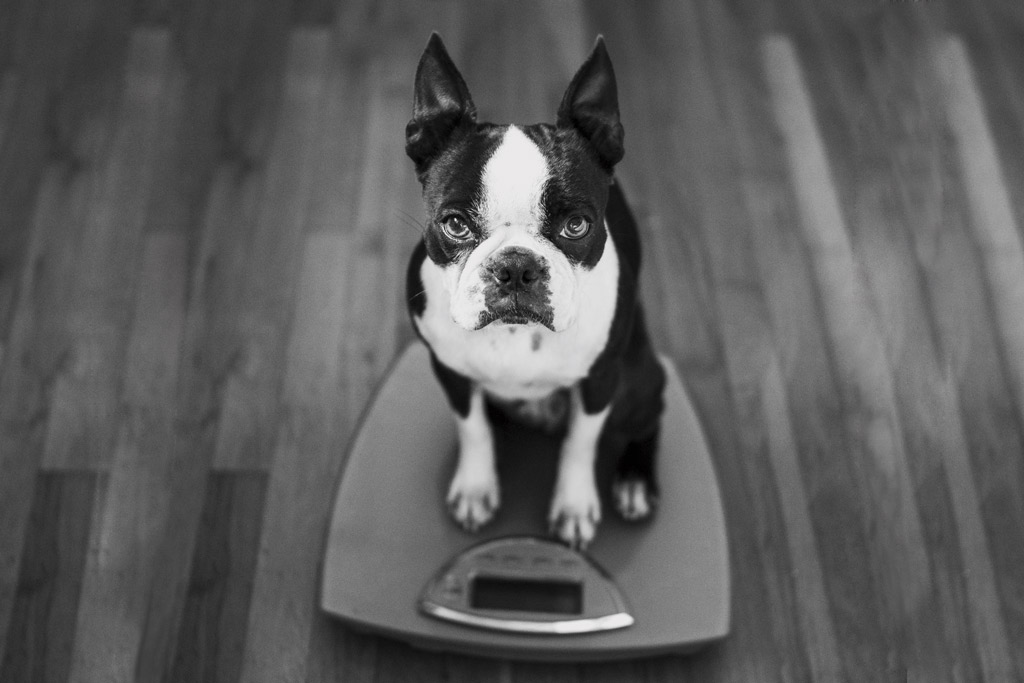
Nowadays there are many dog food options to choose from, but some dogs, like Boston Terriers, do better on a particular diet.
So, what do Boston Terriers eat? A species-appropriate balanced diet, according to their age, to make sure your Boston Terrier gets all the nutrients needed for a healthy and long life.
Let’s see how to put that into practice!
Boston Terrier’s Nutrition
When determining the right diet for your Boston Terrier, consider the following factors:
- Age.
- Size.
- Metabolism.
- Activity level.
Boston Terriers are small-breed dogs that have a fast metabolism with high energy needs. However, depending on their life stage (puppy, adult or senior dog), they need to consume different food quantity.
Generally, adult Bostons eat two meals per day, while puppies should consume between three to four meals. This means that you divide their daily food quantity in “x” number of meals.
P.S. For age-appropriate meal plans and feeding schedule, head on over to our How Much to Feed Boston Terriers? And How Often? blog post for a deep dive.
Here’s a disclaimer:

I am not a veterinarian, so always check with your vet before changing your Boston Terrier’s diet to avoid unexpected consequences.
However, I do have knowledge of dog nutrition and dietary needs.
Food For Your Boston Terrier
So how can you make sure that your pooch gets all the nutrients needed and stays healthy all his life?
Boston Terrier’s Dietary Needs
Before thinking of what to give your Boston Terrier to eat, let’s look at what essential nutrients dogs need in their diet to be healthy.
Whether you buy your dog food or make it yourself, your Boston needs a balanced diet which is species-appropriate to stay healthy.
That kind of diet includes a mix of:
- Proteins.
- Fats.
- Carbohydrates.
- Vitamins.
- Minerals.
- Water.
A Balanced and Species-Appropriate Diet
Boston Terriers should follow a species-appropriate balanced diet, which includes:
- High-quality protein: Lean-muscle meats, fish and eggs.
- Moderate level of animal fat: Meat and fish like salmon and sardines.
- High levels of EPA and DHA: Omega-3 from cod liver oil.
- Enough vitamins and minerals: Organs meats and bones.
- A few carbohydrates like fresh veggies and fruits: Broccoli, kale, blueberries, etc. (mimics prey’s stomach contents).
- No grains.
- No potatoes or other starches.
Plus, your furry friend should be well hydrated.
For more details on essential nutrients and the best diet for Boston Terriers, check out the Boston Terrier Diet blog post.
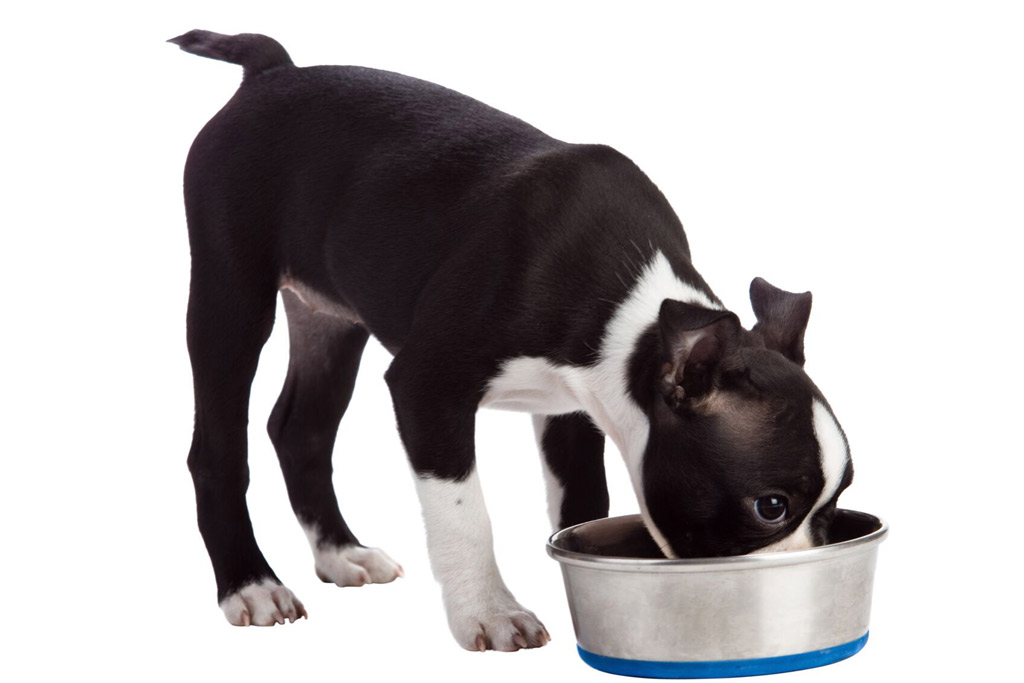
What to Feed Your Boston Terrier
Once knowing what nutrients your Boston Terrier needs to stay healthy, the next step is to choose what types of foods you will feed your pooch.
There are four types of food that you can give your doggie:
Homemade dog food:
- Raw diet: Check Boston Terrier Raw Diet blog post.
Commercial or processed dog food:
- Commercial raw food: Here’s a range of commercial raw food, which is freeze-dried. Brands like Stella & Chewy’s use grass-fed animals, wild-caught fish and organic veggies and fruits.
- Kibble (dry diet): Have a look at the range of dog wholesome food on Amazon.
- Canned food (moist diet): Here’s a range of canned food for dogs that has limited ingredients and it’s grain-free.
When buying food, pay close attention to the ingredients. Processed dog food, for instance, can be grain-based, even if dogs are carnivorous, not vegetarian.
Insider Tip: When choosing food for Bostons, choose small dry kibble that uses wholesome food as its primary ingredient:
– Rich in animal protein (primary ingredient).
– Limited ingredients (to avoid filers).
– Grain-free (allergen-free).
Avoid foods that contain fillers (grains and carbohydrates like corn, wheat, rice, soy) and chemicals because they make your pooch feel bloated. Boston Terriers are prone to gas and when feeding your pooch a diet that is low in protein and high in grains, it causes gas build-up (same goes for humans).
Check Best Diet for Boston Terrier with Sensitive Stomach and Flatulence blog post.
Also, Boston Terriers do better on a diet that is grain, corn and soy-free since they cause food allergies.
Go to Best Diet for Boston Terrier with Sensitive Stomach.
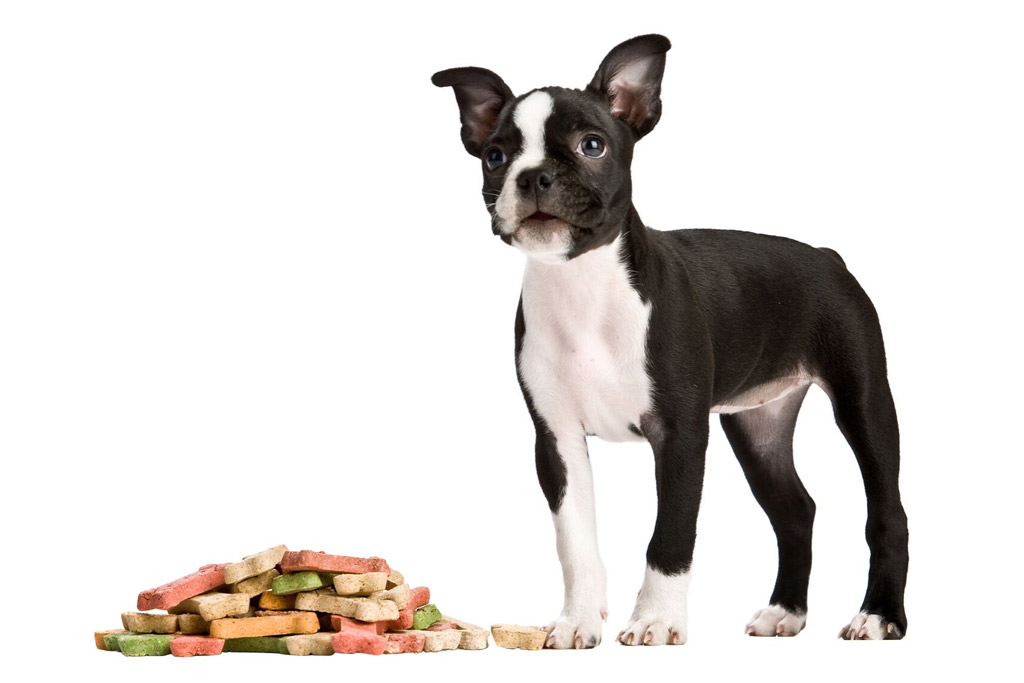
Supplements For Your Boston Terrier
If you are feeding processed food, it won’t contain all the nutrients your dog needs.
High-quality and natural dietary supplements can be extremely beneficial to your Boston’s health and longevity. Plus, they guarantee that your pooch is getting the right nutrients.
Here are some natural supplements that can help your furry friend, especially when feeding him a dry diet:
- Probiotics and Digestive Enzymes capsules: For the gastro-intestinal (GI) tract health.
- Curcumin/Tumeric capsules and Chlorella: For liver and kidney health.
- CoQ10: For the heart.
- Collagen: For joint health.
- MCT Oil: For cognitive health.
- Krill Oil capsules: For skin and coat health.
Giving your fur baby natural dog supplements promotes health and longevity, which is why I talk more about this in our Natural Dog Supplements with Health Benefits You Must Know About blog post.
Safe Human Foods For Your Boston Terriers
You can also feed your dog human foods like blueberries, pumpkin seeds, and green veggies. They are ideal as treats or as part of their meal.
Here is a list of 14 human foods, perfect for sharing with your dog:
- Apples.
- Berries, especially blueberries.
- Bananas.
- Watermelon.
- Carrots.
- Eggs.
- Sweet potatoes.
- Pumpkin seeds.
- Broccoli.
- Sardines.
- Mackerel.
- Salmon.
- Coconut Oil.
- Fermented vegetables like sauerkraut (fermented cabbage).
Read also: Can a Boston Terrier Eat Apples? 10 Other Safe Human Foods.
Toxic Human Foods For Your Boston Terrier
Dogs can be opportunists when it comes to getting their paws on tasty treats. However, not all everyday foods and drinks are safe if they come into contact with them.
So, if what we eat on a daily basis can be toxic food for our pooch, it’s best to get familiar with this toxic food list for dogs:
- Chocolate and chocolate-based products.
- Plants containing allium, including onions, garlic, leeks and chives.
- Macadamia nuts.
- Corn on the cob.
- Avocados.
- All sugars and artificial sweeteners, including xylitol.
- Alcohol.
- Cooked bones.
- Vitis Vinifera fruits, including grapes, raisins, sultanas and currants.
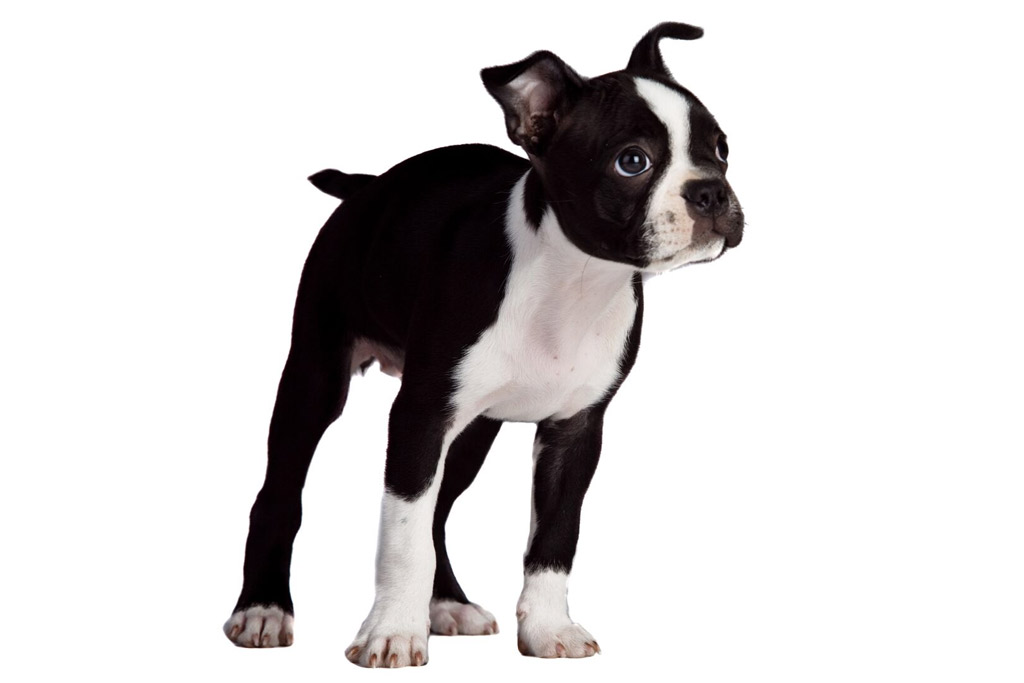
If your Boston Terrier eats any of these, always act immediately and take your dog to your vet. Even small amounts of these items can be fatal, so it’s best to take action immediately.
Read also: Can a Boston Terrier Eat Grapes? And 10 Other Toxic Foods.
Treats For Your Boston Terrier
A high-value dog treat will be healthy and nourishing for your dog. He will not only enjoy the reward but he will also be motivated to work hard to receive it again.
Also, dog treats – even very healthy ones – should not constitute more than 15% of your dog’s daily food intake, and preferably less than 10%.
That’s why it’s best to limit them to:
- Training and behaviour rewards.
- As a bedtime ritual.
- Or as a “time to get in your playpen/crate” enticement.
Here are also a couple of things to bear in mind:
- Overfeeding treats on top of daily food intake will result in an obese dog.
- Brachycephalic breeds (of which the Boston Bull Terrier is one) in particular are more prone to having overweight problems. Although Bostons are less so than others.
- Overfeeding treats while underfeeding balanced meals will result in a dog with nutritional deficiencies.
To keep your dog’s treats healthy, you probably want them to:
- Have natural ingredients (free of preservatives and additives).
- Come from a reputable source.
- Be a single ingredient treat.
P.S. Want some ideas for treats to feed your Boston? Head over to our Boston Terrier Treats blog post to get some.
High-Value Dog Treats for Training
Some quick examples are kibble, blueberries, and dehydrated chicken. You will see the benefits if they follow these criteria:
- Small and quick to consume, so they don’t interrupt the flow of the training session.
- Easy to eat/chew, especially important for senior dogs and puppies.
- High-value, i.e. tasty and healthy.
- Portable and not too messy to handle.
- Fairly non-perishable, so they won’t get spoiled too easily or too quickly.
Depending on your current situation, you might be thinking to yourself “I’d love to do all of this, but I haven’t got the time!”
You’re not alone. I too struggle with this. In fact, arguably 99% of modern-day households struggle with time as well.
That’s why I share the solution I’ve found in my favourite dog treats that can help you provide these treats for your dog on a busy schedule.
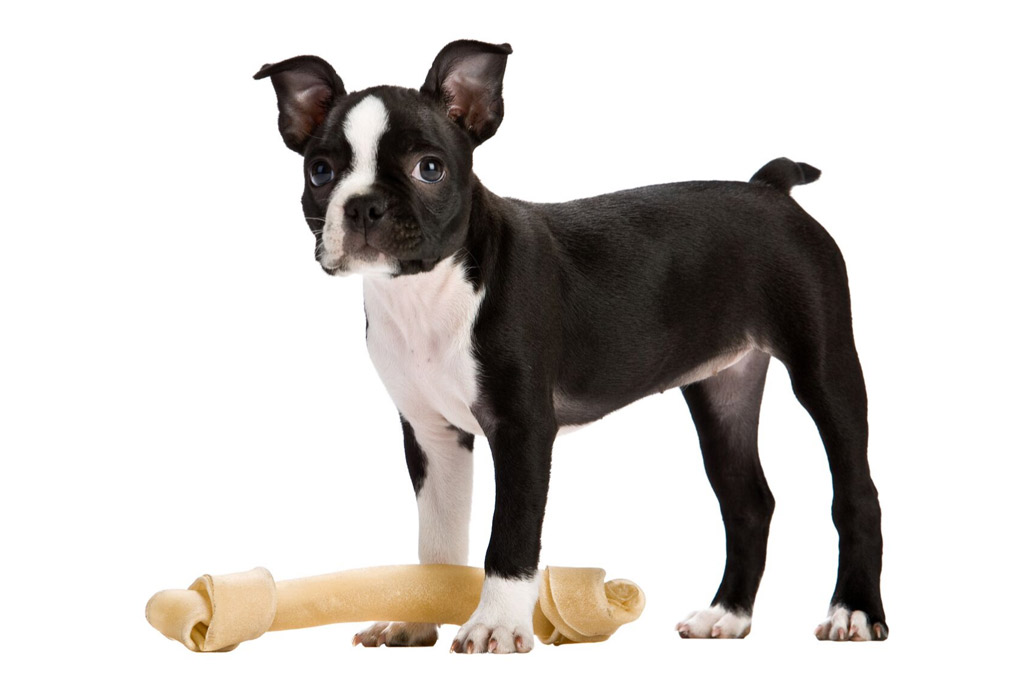
Related Questions
Can a Boston Terrier Eat Apples?
Although apples are a source of vitamins A and C, they also contain sugar in the form of fructose, so dogs should eat them from time to time. Also, remove the seeds before you feed your dog apples since the core is difficult to chew and can be a choking hazard.
Can a Boston Terrier Eat Bananas?
Bananas are rich in potassium but also contain fructose, so feed them to your pooch in moderation.
Can a Boston Terrier Eat Eggs?
Yes, Boston Terriers can eat eggs. This food can be a great source of protein, especially if they are wild-range.
Can a Boston Terrier Eat Grapes?
No. Grapes are Vitis vinifera fruits, like raisins, sultanas and currants. All of these are dangerous food for dogs. The active ingredient which causes the toxin is unknown, however, these four fruits may cause severe liver damage and kidney failure.
Can a Boston Terrier Eat Strawberries?
Like bananas, strawberries also contain fructose, so feed them to your pooch in moderation and raw (without any sugar, syrup, etc.) A healthier alternative, and even richer in antioxidants are blueberries.
Can a Boston Terrier Eat Peanut Butter?
Peanut butter is a source of plant protein and fibre, however, make sure to choose an all-natural peanut butter that does not contain Xylitol or any other sweetener, since these are toxic for dogs.
Can a Boston Terrier Eat Carrots?
Dogs can eat cooked and raw carrots but in moderation. Remember that your pooch is a carnivore and not a vegetarian. Their diet should be high in animal protein and omega-3s.
Can a Boston Terrier Eat Rice?
Although rice is not a toxic food, it’s a carbohydrate that will make your Boston feel bloated, accumulate more gas and fart more.

Would like to know more about food for Boston terrier